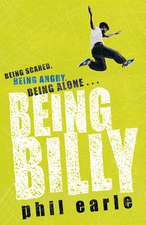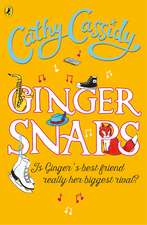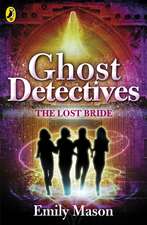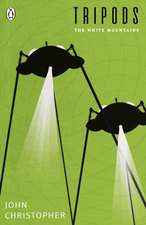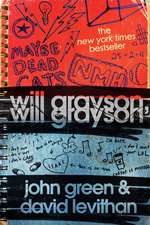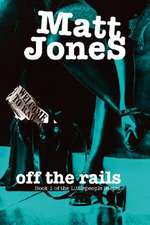Heroes
Autor Robert Cormieren Limba Engleză Paperback – 7 feb 2000 – vârsta de la 12 ani
Vezi toate premiile Carte premiată
Heartland Award (2000)
Francis lost most of his face when he fell on a grenade in France. He received the Silver Star for bravery, but was it really an act of heroism? Now, having survived, he is looking for a man he once admired and respected, a man adored by many people, a man who also received a Silver Star for bravery. A man who destroyed Francis's life.
Francis lost most of his face when he fell on a grenade in France. He received the Silver Star for bravery, but was it really an act of heroism? Now, having survived, he is looking for a man he once admired and respected, a man adored by many people, a man who also received a Silver Star for bravery. A man who destroyed Francis's life. -->
| Toate formatele și edițiile | Preț | Express |
|---|---|---|
| Paperback (2) | 35.70 lei 3-4 săpt. | |
| Laurel Leaf Library – 7 feb 2000 | 35.70 lei 3-4 săpt. | |
| Penguin Books – 29 sep 1999 | 56.13 lei 3-5 săpt. | +4.44 lei 7-13 zile |
Preț: 35.70 lei
Preț vechi: 43.52 lei
-18% Nou
Puncte Express: 54
Preț estimativ în valută:
6.83€ • 7.09$ • 5.70£
6.83€ • 7.09$ • 5.70£
Carte disponibilă
Livrare economică 01-08 martie
Preluare comenzi: 021 569.72.76
Specificații
ISBN-13: 9780440227694
ISBN-10: 0440227690
Pagini: 144
Dimensiuni: 108 x 177 x 12 mm
Greutate: 0.07 kg
Editura: Laurel Leaf Library
Locul publicării:New York, NY
ISBN-10: 0440227690
Pagini: 144
Dimensiuni: 108 x 177 x 12 mm
Greutate: 0.07 kg
Editura: Laurel Leaf Library
Locul publicării:New York, NY
Extras
Oh, I have eyes because I can see and eardrums because I can hear but no ears to speak of, just bits of dangling flesh. But that's fine, like Dr. Abrams says, because it's sight and hearing that count and I was not handsome to begin with. He was joking, of course. He was always trying to make me laugh.
If anything bothers me, it's my nose. Or rather, the absence of my nose. My nostrils are like two small caves and they sometimes get blocked and I have to breathe through my mouth. This dries up my throat and makes it hard for me to swallow. I also become hoarse and cough a lot. My teeth are gone but my jaw is intact and my gums are firm, which makes it possible for me to wear dentures. In the past few weeks, my gums began to shrink, however, and the dentures have become loose and they click when I talk and slip around inside my mouth.
I have no eyebrows, but eyebrows are minor, really. I do have cheeks. Sort of. I mean, the skin that forms my cheeks was grafted from my thighs and has taken a long time to heal. My thighs sting when my pants rub against them. Dr. Abrams says that all my skin will heal in time and my cheeks will someday be as smooth as a baby's arse. That's the way he pronounced it: arse. In the meantime, he said, don't expect anybody to select you for a dance when it's Girls' Choice at the canteen.
Don't take him wrong, please.
He has a great sense of humor and has been trying to get me to develop one.
I have been trying to do just that. But not having much success. -->
The gun is like a tumor on my thigh as I walk through the morning streets against the wind that never dies down. April sunlight stings my eyes but the wind dissipates its heat, blustering against store windows and kicking debris into the gutters.
At Ninth and Spruce, I pause and look up at the three-decker and the windows of the second floor, where Larry LaSalle can be found at last. Does he suspect my presence here on the street? Does he have a premonition that he has only a few minutes left to live?
I am calm. My heartbeat is normal. What's one more death after the others in the villages and fields of France? The innocent faces of the two young Germans appear in my mind. But Larry LaSalle is not innocent.
The steps leading to the second floor are worn from use and age, and I think of all the people who have climbed stairs like these, who have worked in the shops and come home heavy with weariness at the end of the day. As I stand at the door of Larry LaSalle's tenement, I touch the bulge in my pocket to verify the existence of the gun. The sound of my knocking is loud and commanding in the silent hallway.
No response. I wait. I rap on the door again, hand clenched as a fist this time.
"Come on in, the door's not locked," Larry LaSalle calls out. That voice is unmistakable, a bit feeble now, yet still the voice that cheered us at the Wreck Center.
Hesitant suddenly, uncertain--his voice giving reality to what I must do--I step into the tenement and into the fragrance of pea soup simmering on the black stove, steam rising from a big green pot.
He is sitting in a rocking chair by the black coal stove, and narrows his eyes, squinting to see who has come into his tenement. He is pale, eyes sunk into his sockets like in the newsreel at the Plymouth, and he seems fragile now, as if caught in an old photograph that has faded and yellowed with age. His eyes blink rapidly as if taking quick pictures of me. Is there a glimmer of fear in his eyes? My heart quickens at the possibility.
"Francis, Francis Cassavant," I announce. It's important for him to know immediately who I am. I don't want to waste any time.
"Ah, Francis," he says, his eyes flashing pleasure because he doesn't sense my mission.
"Come in, come in," he says, the old enthusiasm back in his voice.
He rises slowly from the chair, steadying therocker as he lifts himself up. As he holds out his hands in greeting, I go forward to meet him. We shake hands. At the last minute, when it seems we might embrace as old friends and comrades, teacher and pupil, I pull away. His white hands clutch the air before he clasps them together and settles back into the chair.
"Sit, sit," he says, indicating the chair next to the window opposite his own.
"Take off your jacket," he says. "Your Red Sox cap, too, and your scarf . . ."
I don't move. I don't take off anything. I don't plan to stay long, only long enough to carry out my mission.
"Don't be afraid to show your face, Francis. That face, what's left of it, is a symbol of how brave you were, the Silver Star you earned . . ."
an excerpt from Heroes
My name is Francis Joseph Cassavant and I have just returned to Frenchtown
in Monument and the war is over and I have no face.
Oh, I have eyes because I can see and eardrums because I can hear but
no ears to speak of, just bits of dangling flesh. But that's fine, like
Dr. Abrams says, because it's sight and hearing that count and I was not
handsome to begin with. He was joking, of course. He was always trying
to make me laugh.
If anything bothers me, it's my nose. Or rather, the absence of my nose.
My nostrils are like two small caves and they sometimes get blocked and
I have to breathe through my mouth. This dries up my throat and makes
it hard for me to swallow. I also become hoarse and cough a lot. My teeth
are gone but my jaw is intact and my gums are firm, which makes it possible
for me to wear dentures. In the past few weeks my gums began to shrink,
however, and the dentures have become loose and they click when I talk
and slip around inside my mouth.
I have no eyebrows, but eyebrows are minor, really. I do have cheeks.
Sort of. I mean, the skin that forms my cheeks was grafted from my thighs
and has taken a long time to heal. My thighs sting when my pants rub against
them. Dr. Abrams says that all my skin will heal in time and my cheeks
will someday be as smooth as a baby's arse. That's the way he pronounced
it: arse. In the meantime, he said, don't expect anybody to select you
for a dance when it's Girl's Choice at the canteen.
Don't take him wrong, please.
He has a great sense of humor and has been trying to get me to develop
one.
I have been trying to do just that.
But not having much success.
If anything bothers me, it's my nose. Or rather, the absence of my nose. My nostrils are like two small caves and they sometimes get blocked and I have to breathe through my mouth. This dries up my throat and makes it hard for me to swallow. I also become hoarse and cough a lot. My teeth are gone but my jaw is intact and my gums are firm, which makes it possible for me to wear dentures. In the past few weeks, my gums began to shrink, however, and the dentures have become loose and they click when I talk and slip around inside my mouth.
I have no eyebrows, but eyebrows are minor, really. I do have cheeks. Sort of. I mean, the skin that forms my cheeks was grafted from my thighs and has taken a long time to heal. My thighs sting when my pants rub against them. Dr. Abrams says that all my skin will heal in time and my cheeks will someday be as smooth as a baby's arse. That's the way he pronounced it: arse. In the meantime, he said, don't expect anybody to select you for a dance when it's Girls' Choice at the canteen.
Don't take him wrong, please.
He has a great sense of humor and has been trying to get me to develop one.
I have been trying to do just that. But not having much success. -->
The gun is like a tumor on my thigh as I walk through the morning streets against the wind that never dies down. April sunlight stings my eyes but the wind dissipates its heat, blustering against store windows and kicking debris into the gutters.
At Ninth and Spruce, I pause and look up at the three-decker and the windows of the second floor, where Larry LaSalle can be found at last. Does he suspect my presence here on the street? Does he have a premonition that he has only a few minutes left to live?
I am calm. My heartbeat is normal. What's one more death after the others in the villages and fields of France? The innocent faces of the two young Germans appear in my mind. But Larry LaSalle is not innocent.
The steps leading to the second floor are worn from use and age, and I think of all the people who have climbed stairs like these, who have worked in the shops and come home heavy with weariness at the end of the day. As I stand at the door of Larry LaSalle's tenement, I touch the bulge in my pocket to verify the existence of the gun. The sound of my knocking is loud and commanding in the silent hallway.
No response. I wait. I rap on the door again, hand clenched as a fist this time.
"Come on in, the door's not locked," Larry LaSalle calls out. That voice is unmistakable, a bit feeble now, yet still the voice that cheered us at the Wreck Center.
Hesitant suddenly, uncertain--his voice giving reality to what I must do--I step into the tenement and into the fragrance of pea soup simmering on the black stove, steam rising from a big green pot.
He is sitting in a rocking chair by the black coal stove, and narrows his eyes, squinting to see who has come into his tenement. He is pale, eyes sunk into his sockets like in the newsreel at the Plymouth, and he seems fragile now, as if caught in an old photograph that has faded and yellowed with age. His eyes blink rapidly as if taking quick pictures of me. Is there a glimmer of fear in his eyes? My heart quickens at the possibility.
"Francis, Francis Cassavant," I announce. It's important for him to know immediately who I am. I don't want to waste any time.
"Ah, Francis," he says, his eyes flashing pleasure because he doesn't sense my mission.
"Come in, come in," he says, the old enthusiasm back in his voice.
He rises slowly from the chair, steadying therocker as he lifts himself up. As he holds out his hands in greeting, I go forward to meet him. We shake hands. At the last minute, when it seems we might embrace as old friends and comrades, teacher and pupil, I pull away. His white hands clutch the air before he clasps them together and settles back into the chair.
"Sit, sit," he says, indicating the chair next to the window opposite his own.
"Take off your jacket," he says. "Your Red Sox cap, too, and your scarf . . ."
I don't move. I don't take off anything. I don't plan to stay long, only long enough to carry out my mission.
"Don't be afraid to show your face, Francis. That face, what's left of it, is a symbol of how brave you were, the Silver Star you earned . . ."
an excerpt from Heroes
My name is Francis Joseph Cassavant and I have just returned to Frenchtown
in Monument and the war is over and I have no face.
Oh, I have eyes because I can see and eardrums because I can hear but
no ears to speak of, just bits of dangling flesh. But that's fine, like
Dr. Abrams says, because it's sight and hearing that count and I was not
handsome to begin with. He was joking, of course. He was always trying
to make me laugh.
If anything bothers me, it's my nose. Or rather, the absence of my nose.
My nostrils are like two small caves and they sometimes get blocked and
I have to breathe through my mouth. This dries up my throat and makes
it hard for me to swallow. I also become hoarse and cough a lot. My teeth
are gone but my jaw is intact and my gums are firm, which makes it possible
for me to wear dentures. In the past few weeks my gums began to shrink,
however, and the dentures have become loose and they click when I talk
and slip around inside my mouth.
I have no eyebrows, but eyebrows are minor, really. I do have cheeks.
Sort of. I mean, the skin that forms my cheeks was grafted from my thighs
and has taken a long time to heal. My thighs sting when my pants rub against
them. Dr. Abrams says that all my skin will heal in time and my cheeks
will someday be as smooth as a baby's arse. That's the way he pronounced
it: arse. In the meantime, he said, don't expect anybody to select you
for a dance when it's Girl's Choice at the canteen.
Don't take him wrong, please.
He has a great sense of humor and has been trying to get me to develop
one.
I have been trying to do just that.
But not having much success.
Recenzii
"[A] powerhouse novel . . . that will follow the reader long after the story has ended."
--Booklist
"Cormier's . . . story will hold fans from the first page to the last."
--Publisher Weekly, starred
"Powerful."
--VOYA, starred
--Booklist
"Cormier's . . . story will hold fans from the first page to the last."
--Publisher Weekly, starred
"Powerful."
--VOYA, starred
Notă biografică
Robert Cormier (pronounced kor-MEER) lived all his life in Leominster, Massachusetts, a small town in the north-central part of the state, where he grew up as part of a close, warm community of French Canadian immigrants. His wife, Connie, also from Leominster, still lives in the house where they raised their three daughters and one son–all adults now. They never saw a reason to leave. “There are lots of untold stories right here on Main Street,” Cormier once said.
A newspaper reporter and columnist for 30 years (working for the Worcester Telegram and Gazette and the Fitchburg Sentinel), Cormier was often inspired by news stories. What makes his works unique is his ability to make evil behavior understandable, though, of course, still evil. “I’m very much interested in intimidation,” he told an interviewer from School Library Journal. “And the way people manipulate other people. And the obvious abuse of authority.” All of these themes are evident in his young adult classic and best-known book, The Chocolate War. A 15-year-old fan of his said, “You always write from inside the person.”
Cormier traveled the world, from Australia (where he felt particularly thrilled by putting his hand in the Indian Ocean) and New Zealand to most of the countries in Europe, speaking at schools, colleges, and universities and to teacher and librarian associations. He visited nearly every state in the nation. While Cormier loved to travel, he said many times that he also loved returning to his home in Leominster.
Cormier was a practicing Catholic and attended parochial school, where in seventh grade, one of his teachers discovered his ability to write. But he said he had always wanted to be a writer: “I can’t remember a time when I wasn’t trying to get something down on paper.” His first poems were published in the Leominster Daily Enterprise, and his first professional publication occurred while he was a freshman at Fitchburg State College. His professor, Florence Conlon, sent his short story, without his knowledge, to The Sign, a national Catholic magazine. The story, titled “The Little Things That Count,” sold for $75.
Cormier’s first work as a writer was at radio station WTAG in Worcester, MA, where he wrote scripts and commercials from 1946 to 1948. In 1948, he began his award-winning career as a newspaperman with the Worcester Telegram, first in its Leominster office and later in its Fitchburg office. He wrote a weekly human-interest column, “A Story from the Country,” for that newspaper.
In 1955, Cormier joined the staff of the Fitchburg Sentinel, which later became the Fitchburg-Leominster Sentinel and Enterprise, as the city hall and political reporter. He later served as wire and associate editor and wrote a popular twice-weekly column under the pseudonym John Fitch IV. The column received the national K.R. Thomason Award in 1974 as the best human-interest column written that year. That same year, he was honored by the New England Associated Press Association for having written the best news story under pressure of deadline. He left newspaper work in 1978 to devote all his time to writing.
Robert Cormier’s first novel, Now and at the Hour, was published in 1960. Inspired by his father’s death, the novel drew critical acclaim and was featured by Time magazine for five weeks on its “Recommended Reading” list. It was followed in 1963 by A Little Raw on Monday Mornings and in 1965 by Take Me Where the Good Times Are, also critically acclaimed. The author was hailed by the Newark Advocate as being “in the first rank of American Catholic novelists.”
In 1974, Cormier published The Chocolate War, the novel that is still a bestseller a quarter century after its publication. Instantly acclaimed, it was also the object of censorship attempts because of its uncompromising realism. In a front-page review in a special children’s issue of The New York Times Book Review, it was described as “masterfully structured and rich in theme,” and it went on to win countless awards and honors, was taught in schools and colleges throughout the world, and was translated into more than a dozen languages. I Am the Cheese followed in 1977 and After the First Death in 1979.
These three books established Cormier as a master of the young adult novel. In 1991, the Young Adult Services Division of the American Library Association presented him with the Margaret A. Edwards Award, citing the trio of books as “brilliantly crafted and troubling novels that have achieved the status of classics in young adult literature.”
In 1982, Cormier was honored by the National Council of Teachers of English and its Adolescent Literature Assembly (ALAN) for his “significant contribution to the field of adolescent literature” and for his “innovative creativity.”
8 Plus 1, an anthology of short stories that have appeared in such publications as the Saturday Evening Post, The Sign, and Redbook, was published in 1980. In later years, many of the stories in the collection, notably “The Moustache,” “President Cleveland, Where Are You?” and “Mine on Thursdays,” appeared in anthologies and school textbooks. The collection also received the World of Reading Readers’ Choice Award, sponsored by Silver Burdett & Ginn, especially notable because young readers voted for Cormier to receive the prize.
I Have Words to Spend, a collection of his newspaper and magazine columns, was published in 1991, assembled and edited by his wife, Connie.
Robert Cormier’s other novels include The Bumblebee Flies Anyway, 1983; Beyond the Chocolate War, 1985; Fade, 1988; Other Bells for Us to Ring, 1990; We All Fall Down, 1991; Tunes for Bears to Dance To, 1992; In the Middle of the Night, 1995; Tenderness, 1997; Heroes, 1998; and Frenchtown Summer, 1999. This novel won the Los Angeles Times Book Prize for Young Adult Fiction in April 2000. All his novels have won critical praise and honors.
In the Middle of the Night and Tenderness were short-listed for the Carnegie Medal in England, and Heroes received a “Highly Commended” citation for that same award, unique honors because the Carnegie is traditionally awarded to a British book.
Cormier's novels have frequently come under attack by censorship groups because they are uncompromising in their depictions of the problems young people face each day in a turbulent world. Teachers and librarians have been quick to point out that his novels are eminently teachable, valuable, and moral. His novels are taught in hundreds of schools and in adolescent literature courses in colleges and universities.
Though many of his books are described as written for young adults, in fact people of all ages read and enjoy Cormier’s work. His themes of the ordinariness of evil and what happens when good people stand by and do nothing are treated seriously, and he never provides the easy comfort of a happy ending. Cormier’s gripping stories explore some of the darker corners of the human psyche, but always with a moral focus and a probing intelligence that compel readers to examine their own feelings and ethical beliefs.
In an interview last year, Cormier was asked if he had accomplished what he set out to do at the beginning of his writing career. He answered with characteristic humility: “Oh, yes. My dream was to be known as a writer and to be able to produce at least one book that would be read by people. That dream came true with the publication of my first novel–and all the rest has been a sweet bonus. All I’ve ever wanted to do, really, was to write.” That writing has left the world a legacy of wonderful books, a body of work that will endure.
A newspaper reporter and columnist for 30 years (working for the Worcester Telegram and Gazette and the Fitchburg Sentinel), Cormier was often inspired by news stories. What makes his works unique is his ability to make evil behavior understandable, though, of course, still evil. “I’m very much interested in intimidation,” he told an interviewer from School Library Journal. “And the way people manipulate other people. And the obvious abuse of authority.” All of these themes are evident in his young adult classic and best-known book, The Chocolate War. A 15-year-old fan of his said, “You always write from inside the person.”
Cormier traveled the world, from Australia (where he felt particularly thrilled by putting his hand in the Indian Ocean) and New Zealand to most of the countries in Europe, speaking at schools, colleges, and universities and to teacher and librarian associations. He visited nearly every state in the nation. While Cormier loved to travel, he said many times that he also loved returning to his home in Leominster.
Cormier was a practicing Catholic and attended parochial school, where in seventh grade, one of his teachers discovered his ability to write. But he said he had always wanted to be a writer: “I can’t remember a time when I wasn’t trying to get something down on paper.” His first poems were published in the Leominster Daily Enterprise, and his first professional publication occurred while he was a freshman at Fitchburg State College. His professor, Florence Conlon, sent his short story, without his knowledge, to The Sign, a national Catholic magazine. The story, titled “The Little Things That Count,” sold for $75.
Cormier’s first work as a writer was at radio station WTAG in Worcester, MA, where he wrote scripts and commercials from 1946 to 1948. In 1948, he began his award-winning career as a newspaperman with the Worcester Telegram, first in its Leominster office and later in its Fitchburg office. He wrote a weekly human-interest column, “A Story from the Country,” for that newspaper.
In 1955, Cormier joined the staff of the Fitchburg Sentinel, which later became the Fitchburg-Leominster Sentinel and Enterprise, as the city hall and political reporter. He later served as wire and associate editor and wrote a popular twice-weekly column under the pseudonym John Fitch IV. The column received the national K.R. Thomason Award in 1974 as the best human-interest column written that year. That same year, he was honored by the New England Associated Press Association for having written the best news story under pressure of deadline. He left newspaper work in 1978 to devote all his time to writing.
Robert Cormier’s first novel, Now and at the Hour, was published in 1960. Inspired by his father’s death, the novel drew critical acclaim and was featured by Time magazine for five weeks on its “Recommended Reading” list. It was followed in 1963 by A Little Raw on Monday Mornings and in 1965 by Take Me Where the Good Times Are, also critically acclaimed. The author was hailed by the Newark Advocate as being “in the first rank of American Catholic novelists.”
In 1974, Cormier published The Chocolate War, the novel that is still a bestseller a quarter century after its publication. Instantly acclaimed, it was also the object of censorship attempts because of its uncompromising realism. In a front-page review in a special children’s issue of The New York Times Book Review, it was described as “masterfully structured and rich in theme,” and it went on to win countless awards and honors, was taught in schools and colleges throughout the world, and was translated into more than a dozen languages. I Am the Cheese followed in 1977 and After the First Death in 1979.
These three books established Cormier as a master of the young adult novel. In 1991, the Young Adult Services Division of the American Library Association presented him with the Margaret A. Edwards Award, citing the trio of books as “brilliantly crafted and troubling novels that have achieved the status of classics in young adult literature.”
In 1982, Cormier was honored by the National Council of Teachers of English and its Adolescent Literature Assembly (ALAN) for his “significant contribution to the field of adolescent literature” and for his “innovative creativity.”
8 Plus 1, an anthology of short stories that have appeared in such publications as the Saturday Evening Post, The Sign, and Redbook, was published in 1980. In later years, many of the stories in the collection, notably “The Moustache,” “President Cleveland, Where Are You?” and “Mine on Thursdays,” appeared in anthologies and school textbooks. The collection also received the World of Reading Readers’ Choice Award, sponsored by Silver Burdett & Ginn, especially notable because young readers voted for Cormier to receive the prize.
I Have Words to Spend, a collection of his newspaper and magazine columns, was published in 1991, assembled and edited by his wife, Connie.
Robert Cormier’s other novels include The Bumblebee Flies Anyway, 1983; Beyond the Chocolate War, 1985; Fade, 1988; Other Bells for Us to Ring, 1990; We All Fall Down, 1991; Tunes for Bears to Dance To, 1992; In the Middle of the Night, 1995; Tenderness, 1997; Heroes, 1998; and Frenchtown Summer, 1999. This novel won the Los Angeles Times Book Prize for Young Adult Fiction in April 2000. All his novels have won critical praise and honors.
In the Middle of the Night and Tenderness were short-listed for the Carnegie Medal in England, and Heroes received a “Highly Commended” citation for that same award, unique honors because the Carnegie is traditionally awarded to a British book.
Cormier's novels have frequently come under attack by censorship groups because they are uncompromising in their depictions of the problems young people face each day in a turbulent world. Teachers and librarians have been quick to point out that his novels are eminently teachable, valuable, and moral. His novels are taught in hundreds of schools and in adolescent literature courses in colleges and universities.
Though many of his books are described as written for young adults, in fact people of all ages read and enjoy Cormier’s work. His themes of the ordinariness of evil and what happens when good people stand by and do nothing are treated seriously, and he never provides the easy comfort of a happy ending. Cormier’s gripping stories explore some of the darker corners of the human psyche, but always with a moral focus and a probing intelligence that compel readers to examine their own feelings and ethical beliefs.
In an interview last year, Cormier was asked if he had accomplished what he set out to do at the beginning of his writing career. He answered with characteristic humility: “Oh, yes. My dream was to be known as a writer and to be able to produce at least one book that would be read by people. That dream came true with the publication of my first novel–and all the rest has been a sweet bonus. All I’ve ever wanted to do, really, was to write.” That writing has left the world a legacy of wonderful books, a body of work that will endure.
Textul de pe ultima copertă
Francis Joseph Cassavant is eighteen. He has just returned home from the Second World War, and he has no face. He does have a gun and a mission: to murder his childhood hero.
Francis lost most of his face when he fell on a grenade in France. He received the Silver Star for bravery, but was it really an act of heroism? Now, having survived, he is looking for a man he once admired and respected, a man adored by many people, a man who also received a Silver Star for bravery. A man who destroyed Francis's life.
Descriere
Francis Cassavant, 18, lost most of his face when he fell on a grenade in France during the war. He received the Silver Star for bravery, but was it really an act of heroism? Now, having survived, he is looking for a man he once admired--a man that ruined Francis' life.
Premii
- Heartland Award Winner, 2000








